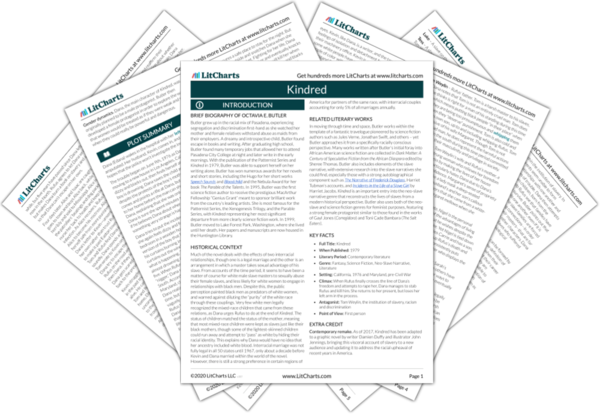Sarah Quotes in Kindred
The expression in her eyes had gone from sadness—she seemed almost ready to cry—to anger. Quiet, almost frightening anger. Her husband dead, three children sold, the fourth defective, and her having to thank God for the defect. She had reason for more than anger. How amazing that Weylin had sold her children and still kept her to cook his meals. How amazing that he was still alive.

Unlock explanations and citation info for this and every other Kindred quote.
Plus so much more...
Get LitCharts A+She had done the safe thing—had accepted a life of slavery because she was afraid. She was the kind of woman who might have been called "mammy" in some other household. She was the kind of woman who would be held in contempt during the militant nineteen sixties. The house-nigger, the handkerchief-head, the female Uncle Tom—the frightened powerless woman who had already lost all she could stand to lose, and who knew as little about the freedom of the North as she knew about the hereafter.
Sarah had cornered me once and said, "What you let her talk to you like that for? She can't get away with it with nobody else."
I didn't know. Guilt, maybe. In spite of everything, my life was easier than hers. Maybe I tried to make up for that by taking her abuse…
"If you go on talking to me the way you do, I won't care what he does to you."
She looked at me for a long time without saying anything. Finally, she smiled. "You'll care. And you'll help me. Else, you'd have to see yourself for the white nigger you are, and you couldn't stand that."

Sarah Quotes in Kindred
The expression in her eyes had gone from sadness—she seemed almost ready to cry—to anger. Quiet, almost frightening anger. Her husband dead, three children sold, the fourth defective, and her having to thank God for the defect. She had reason for more than anger. How amazing that Weylin had sold her children and still kept her to cook his meals. How amazing that he was still alive.

Unlock explanations and citation info for this and every other Kindred quote.
Plus so much more...
Get LitCharts A+She had done the safe thing—had accepted a life of slavery because she was afraid. She was the kind of woman who might have been called "mammy" in some other household. She was the kind of woman who would be held in contempt during the militant nineteen sixties. The house-nigger, the handkerchief-head, the female Uncle Tom—the frightened powerless woman who had already lost all she could stand to lose, and who knew as little about the freedom of the North as she knew about the hereafter.
Sarah had cornered me once and said, "What you let her talk to you like that for? She can't get away with it with nobody else."
I didn't know. Guilt, maybe. In spite of everything, my life was easier than hers. Maybe I tried to make up for that by taking her abuse…
"If you go on talking to me the way you do, I won't care what he does to you."
She looked at me for a long time without saying anything. Finally, she smiled. "You'll care. And you'll help me. Else, you'd have to see yourself for the white nigger you are, and you couldn't stand that."











